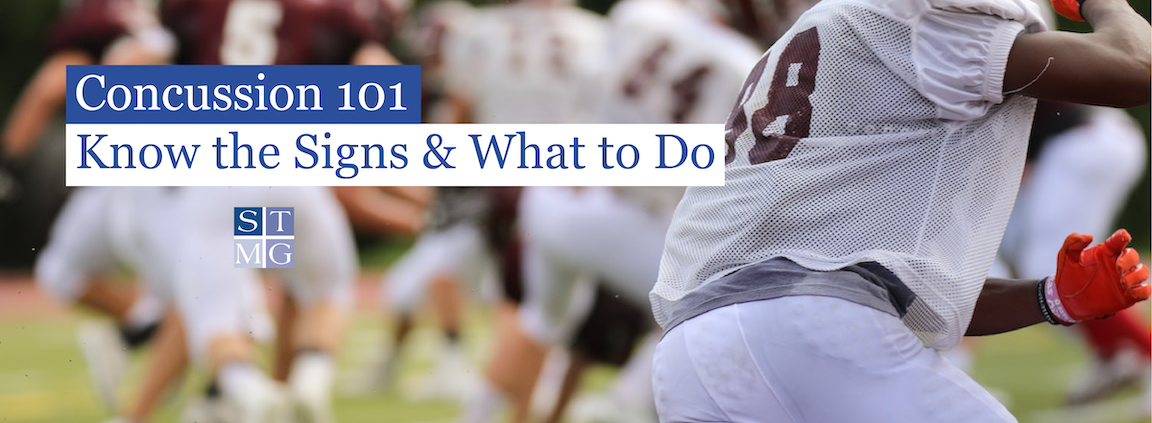Concussion 101: Know the Signs & What to Do
/in Uncategorized/by Nicole ClawsonAs summer winds down and the school year starts up, so does the sports season. In fact, approximately three out of four US households with school-aged children have at least one child involved in organized sports, according to the Aspen Institute.
Playing youth sports offers a number of benefits. Children develop strength, coordination, confidence and social skills, all while learning important lessons about work ethic and being part of a team. But with those benefits comes risk… specifically, risk of concussion.
According to Brain Injury Research Institute, an estimated 1.6 to 3.8 million sports- and recreation-related concussions occur in the United States each year. During one four-year period, the Institute reported that six percent of all sports-related Emergency Department visits by children ages 5 to 18 involved concussion.
What Is Concussion?
A concussion is a type of traumatic brain injury (TBI) that may occur when the head or body sustains an impact, causing the brain to move quickly in the skull. This quick and sudden shift can cause damage to brain cells and result in chemical imbalances.
The Signs of Concussion
Concussions may not always present obvious symptoms. It’s somewhat common for kids and teens who have experienced a concussion to say they just “don’t feel right.” Parents may notice their child:
- Is forgetful or confused about what’s going on in the game.
- Is slow to answer questions.
- Moves clumsily.
- Appears to be stunned.
- Exhibits changes in personality, mood, or behavior.
- Has trouble recalling events that occurred before the impact.
Of course, if your child loses consciousness – even briefly – then removal from play and concussion evaluation is strongly recommended.
Self-Reported Concussion Signs & Symptoms
We’ve discussed a few signs and symptoms that parents can observe. However, it’s also critical that your child knows the symptoms of concussion, so that they can be “on guard” and perhaps more likely to remove themselves from play should they experience a concussion and no one else notices. Self-reported symptoms include:
- Headache or pressure in the head
- Nausea or vomiting
- Balance issues
- Dizziness
- Blurry or double vision
- Troubled by noise or light
- Feeling sluggish or in a haze
- Feeling confused
- Having trouble concentrating or remembering things
- Feeling “down” or “off”
For more information, view a “Fact Sheet for Youth Sports Parents” from the Centers for Disease Control and Prevention. CDC Heads Up offers many additional resources for parents, players, coaches, and providers.
What to Do In the Event of a Concussion?
If you believe your child may have sustained a concussion, remove them from play immediately. Your child should take the rest of the day off and be seen by a healthcare provider for evaluation. Only after receiving a return-to-play clearance from a provider should your child get back to practice or gameplay. Don’t try to determine the severity of the injury on your own. Instead, defer to a licensed provider, as symptoms may not appear until hours or days after the trauma. Concussion can be a serious brain injury; you don’t want to rush the recovery process!
Concussion Law In Tennessee
In April 2013, Tennessee joined 43 other states in passing a sports concussion law designed to protect youth athletes and increase awareness of the risk of concussion and traumatic brain injury. According to Tennessee state law:
- Youth athletes and parents must sign a concussion form before competing.
- Coaches are required to immediately remove an athlete who appears to have suffered a concussion from play and practice.
- Youth athletes who have sustained a concussion must be cleared by a licensed healthcare provider before returning to play or practice.
Learn more about the Concussion Law in Tennessee, and download policies, forms, and other documents here.
See a Family Doctor in Nashville for Concussion Evaluation
Are you concerned that your child may have experienced a concussion? Do you need a post-concussion evaluation or return-to-play clearance? Schedule an appointment with your family doctor at St. Thomas Medical Group in Nashville online or by calling +1 (615) 301-7040.
Vertigo May Affect As Many As 40% of Adults Age 40+
/in Uncategorized/by Nicole ClawsonOne in ten people experience vertigo, and four in ten adults age 40 and older will experience vertigo at some point in their lives. Vertigo is characterized by dizziness or a feeling that the room is spinning. This sensation is sometimes accompanied by nausea and vomiting.
ENT doctors at St. Thomas Medical Group help adults suffering from temporary and permanent vertigo throughout the greater Nashville area. Let’s take a closer look at this common health issue…
What Causes Vertigo?
Benign paroxysmal positional vertigo (BPPV) is caused by small crystals in the vestibular labyrinth (within the inner ear) becoming loose and moving into nearby semicircular canals. As a result, head positioning can be very sensitive, causing dizziness and other vertigo symptoms. The good news is, treatment is available for this condition. Learn more below.
What Treatment Options Are Available?
Some cases of vertigo can be resolved through in-office maneuvers performed by your doctor or a physical therapist. These maneuvers, which involve positioning the neck and head, aim to return dislodged crystals in the ear canal to their appropriate place.
Your ENT doctor at St. Thomas Medical Group may also recommend a diuretic (water pill) to reduce fluid retention, an issue that may contribute to vertigo. However, diuretics may not be right for all patients; talk to your doctor to learn more. Inner ear injections and surgery may be options for severe cases, though these approaches are certainly not common frontline therapies.
What Else You Can Do…
Reduce vertigo symptoms at home by:
- Sitting upright on the edge of the bed for a few minutes before getting up.
- Develop balance with yoga or similar exercises.
- Move your head slowly; avoid sudden, jerking motions.
Vertigo Can Increase Risk for Falls
Vertigo isn’t just uncomfortable; it can actually put individuals at an increased risk for falls, which can be life-threatening. According to one study, “The presence of dizziness in the elderly is a strong predictor of falls, which is the leading cause of accidental death in people older than 65 years.” Because vertigo can lead to falls, which can cause brain injury, broken bones, and other complications, it’s especially important to see a physician for vertigo.
ENT Doctors in Nashville, TN | Vertigo Treatment Available
Do you struggle with vertigo or dizzy spells? Find an ENT doctor near you at St. Thomas Medical Group. Call +1 (615) 386-9089 or visit the Nashville ENT & Allergy Clinic’s online home for more information.




